
by Kirk Anderson

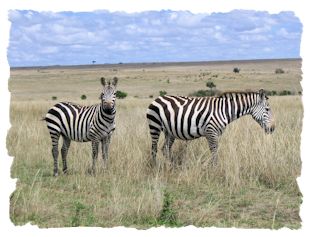 There
are many game reserves in Kenya, all with incredible sights and
five-star accommodation, We managed to stay at three and visit four of
these in our week on Safari.
There
are many game reserves in Kenya, all with incredible sights and
five-star accommodation, We managed to stay at three and visit four of
these in our week on Safari. We landed in Nairobi, stayed overnight in a hotel and the following morning set off to the Shaba National Reserve in our little convoy of touring minibuses. The journey takes about six hours, and for the poverty-virgins amongst us the first dose of culture shock set in. We passed through many little towns, all set back from the road in the mud, children plaintively holding their hands out to us as we passed through. The roads themselves were in a bad state of repair, our drivers swerving from side to side to avoid the larger potholes, sometimes it was a smoother ride in the mud beside the road.
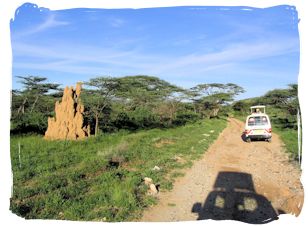 We arrived at Shaba and, once through the gates of the reserve, all
signs of poverty disappeared, to be replaced by magnificent vistas of
Umbrella Acacia trees and giant termite mounds. Our accommodation was a
fantastic collection of colonial style chalets set along a raging river
complete with crocodiles and Vervet Monkeys swinging through the trees.
After freshening up and a meal in the open-sided restaurant over looking
the river, we went on the first of many game drives. That evening we had
our
We arrived at Shaba and, once through the gates of the reserve, all
signs of poverty disappeared, to be replaced by magnificent vistas of
Umbrella Acacia trees and giant termite mounds. Our accommodation was a
fantastic collection of colonial style chalets set along a raging river
complete with crocodiles and Vervet Monkeys swinging through the trees.
After freshening up and a meal in the open-sided restaurant over looking
the river, we went on the first of many game drives. That evening we had
our
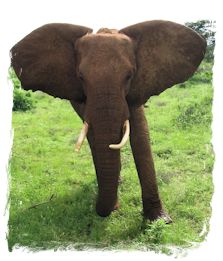 first encounters with the local wild life, impala, zebra, oryx &
gerenuk. We returned to our camp as the sun was setting for a
well-earned night’s rest.
first encounters with the local wild life, impala, zebra, oryx &
gerenuk. We returned to our camp as the sun was setting for a
well-earned night’s rest.We were woken the next morning by the shouting of the local Samburu tribesmen the hotel employs to stop the vervet monkeys harassing the guests in their chalets. After an early breakfast, we set off to the neighbouring Samburu Reserve, home of the Samburu Tribe. On the way to the Samburu village we had some close encounters with elephants and giraffes, as well as a distant lion sunning itself on a rock, buffalo and the amusingly named Dikdik.
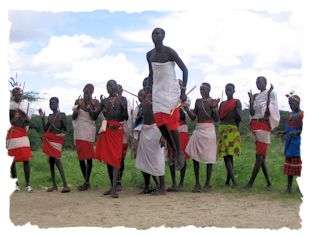 We arrived at the Samburu village and, after paying the village
chieftain about £10 per person in our party, the men of the village came
out and did some tribal dancing, chanting and bouncing for us. After we
joined the men in their dancing for a while, the women of the village
then came out and danced, sang and bobbed up and down before leading the
women in our little group into the village one-by-one. The rest of us
followed and we were then treated to a modest tour of the inside of a
Samburu hut were a young tribesman told us all about drinking blood from
the tribe’s cattle, and how the more cattle a man had, the more wives he
could have.
We arrived at the Samburu village and, after paying the village
chieftain about £10 per person in our party, the men of the village came
out and did some tribal dancing, chanting and bouncing for us. After we
joined the men in their dancing for a while, the women of the village
then came out and danced, sang and bobbed up and down before leading the
women in our little group into the village one-by-one. The rest of us
followed and we were then treated to a modest tour of the inside of a
Samburu hut were a young tribesman told us all about drinking blood from
the tribe’s cattle, and how the more cattle a man had, the more wives he
could have.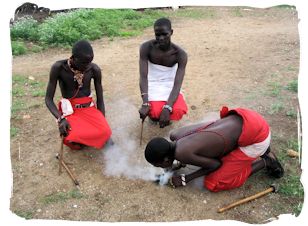 After we had run the gauntlet of the village market and bought all kinds
of carved animals and necklaces that we didn’t really want and were
cheaper at the hotel anyway (the locals are very good at bartering), we
dished out some pens to the village children (always take a large supply
of ball-point pens with you to Kenya) and hopped back into our vehicles
and headed back to the hotel. Having fought our way past the monkeys to
our chalets we headed to the restaurant for dinner, an experience
somewhat spoiled by the fact that it seemed to be raining small black
beetles. Watching the crocs being fed by the river on our way to bed
made a fitting end to a long day.
After we had run the gauntlet of the village market and bought all kinds
of carved animals and necklaces that we didn’t really want and were
cheaper at the hotel anyway (the locals are very good at bartering), we
dished out some pens to the village children (always take a large supply
of ball-point pens with you to Kenya) and hopped back into our vehicles
and headed back to the hotel. Having fought our way past the monkeys to
our chalets we headed to the restaurant for dinner, an experience
somewhat spoiled by the fact that it seemed to be raining small black
beetles. Watching the crocs being fed by the river on our way to bed
made a fitting end to a long day.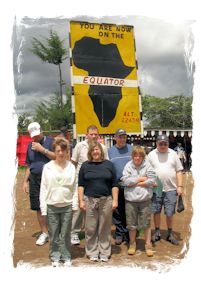 The next morning we set off early to our next destination, Lake Nakuru.
On the way we crossed the Equator, and stopped at one of the many carved
animal selling cooperatives for a quick loo break and to buy some more
souvenirs at four times the price in the hotels even after a long
bartering process. We were shown (for a small fee per person) how the
Coriolis Effect causes water to drain by turning one way in the Northern
Hemisphere and the other in the Southern.
The next morning we set off early to our next destination, Lake Nakuru.
On the way we crossed the Equator, and stopped at one of the many carved
animal selling cooperatives for a quick loo break and to buy some more
souvenirs at four times the price in the hotels even after a long
bartering process. We were shown (for a small fee per person) how the
Coriolis Effect causes water to drain by turning one way in the Northern
Hemisphere and the other in the Southern.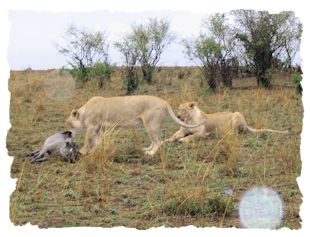 Our accommodation at Lake Nakuru was not as pleasant as that at Shaba,
however the game drive was productive in that we saw buffalo, waterbuck,
baboons, colobus monkeys, more impala, zebra (a different sort to the
ones at Shaba), white rhinos (complete with baby) and a whole huge lake
surrounded by a pink tide of flamingos. We parked up near the lake and
traversed half a mile of sand and flamingo poo for a photo opportunity
in front of the flamingos.
Our accommodation at Lake Nakuru was not as pleasant as that at Shaba,
however the game drive was productive in that we saw buffalo, waterbuck,
baboons, colobus monkeys, more impala, zebra (a different sort to the
ones at Shaba), white rhinos (complete with baby) and a whole huge lake
surrounded by a pink tide of flamingos. We parked up near the lake and
traversed half a mile of sand and flamingo poo for a photo opportunity
in front of the flamingos.That evening we returned to the hotel to watch some local tribesmen (and women) performing some of their native dances and drumming.
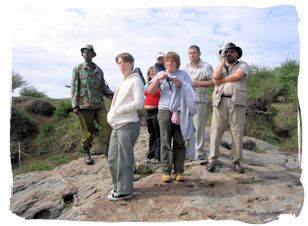 The next day we had a very long drive to what is probably Kenya’s most
famous Reserve, the Maasai Mara. We were staying in tents at the Maasai
lodge, although I’ve never slept in a tent with en suite facilities
before. That evening’s game drive was probably the best so far, we saw
vultures, more elephants and a couple of lionesses frolicking with a
freshly killed warthog.
The next day we had a very long drive to what is probably Kenya’s most
famous Reserve, the Maasai Mara. We were staying in tents at the Maasai
lodge, although I’ve never slept in a tent with en suite facilities
before. That evening’s game drive was probably the best so far, we saw
vultures, more elephants and a couple of lionesses frolicking with a
freshly killed warthog. The next day we drove to a river and Kenyan soldiers armed with AK-47s escorted us down to the river bank where we saw hippos and crocs frolicking in the waters. After a quick stop at the border with Tanzania we returned to the camp for drinks around a roaring fire.
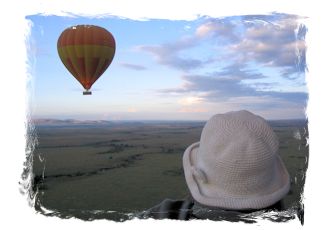
4:30am the next morning saw us departing the camp for what was probably the highlight of the holiday, a sunrise hot-air balloon safari over the Maasai Mara. We tracked a cheetah from the air and watched the sun rise over the spectacular landscape before landing for an open air breakfast in the middle of nowhere. On the way back to the camp we found the cheetah we had been flying over earlier sitting with her freshly caught breakfast.
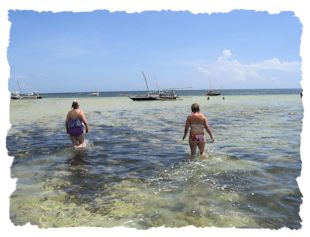 That afternoon we visited a Maasai village and, after handing over the
usual amount of Kenyan Shillings, were treated to another chanting,
dancing and bouncing extravaganza followed by a tour of the huts and
another bartering session in the village market place. We handed out
pens to the children again and then returned to the camp for our final
night.
That afternoon we visited a Maasai village and, after handing over the
usual amount of Kenyan Shillings, were treated to another chanting,
dancing and bouncing extravaganza followed by a tour of the huts and
another bartering session in the village market place. We handed out
pens to the children again and then returned to the camp for our final
night. The next day we had another long and bone-jarring ride back to Nairobi, stopping briefly to be mobbed by about thirty muddy children who thrust their arms through the windows of our vehicles begging for pens until a local tribal elder came and chased them off for us.
Once in Nairobi we collected luggage we’d left at the hotel there a week before and boarded a plane to Mombasa for a week of relaxing around the pool at a luxury beachside hotel.